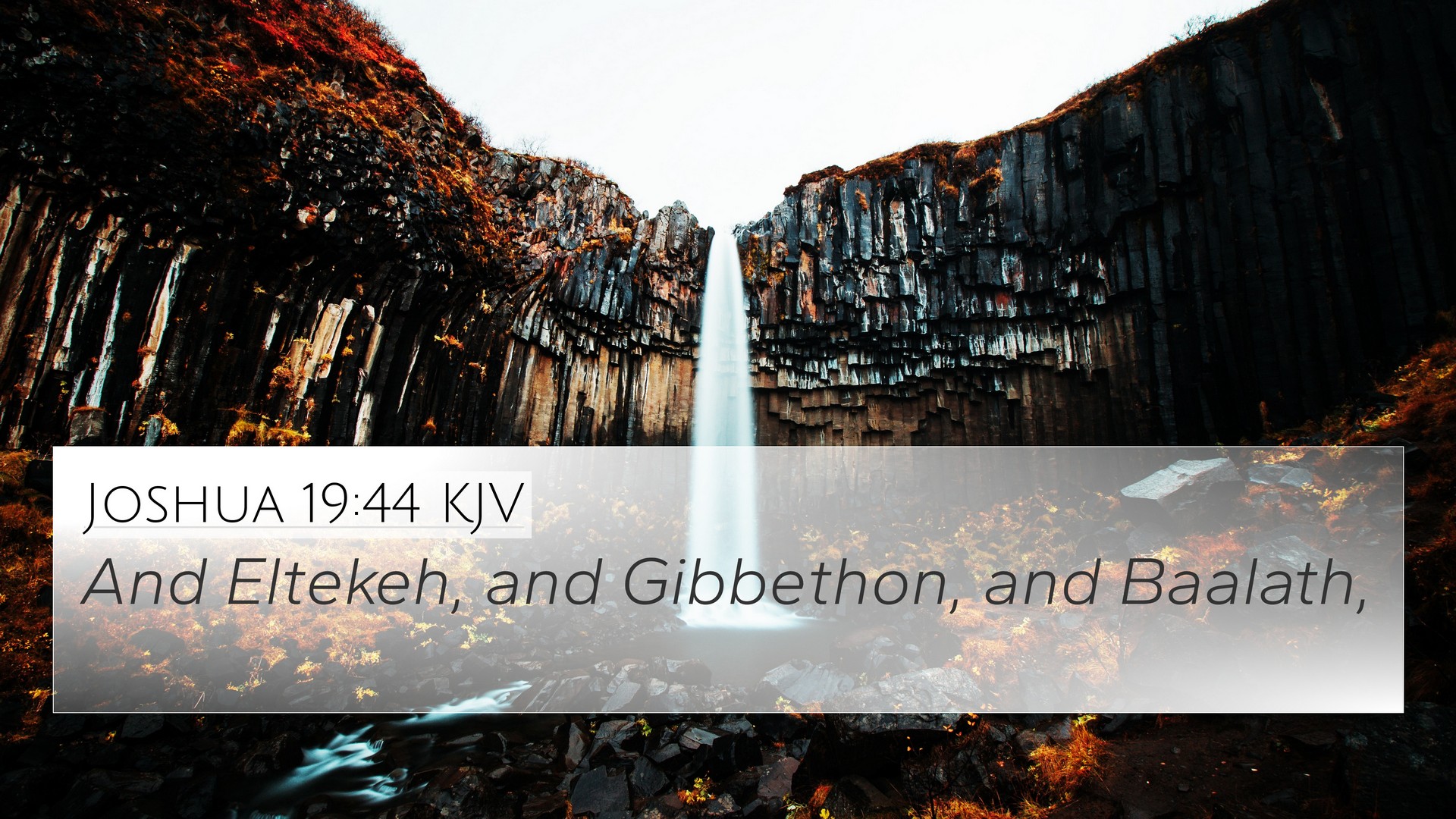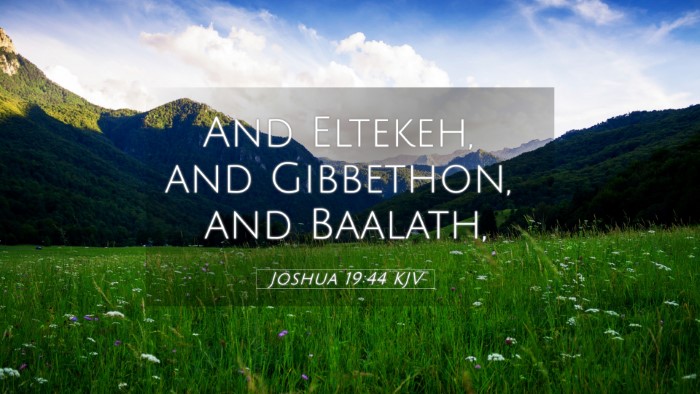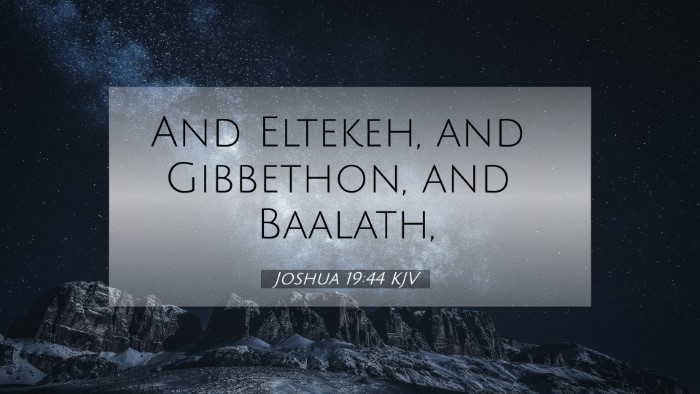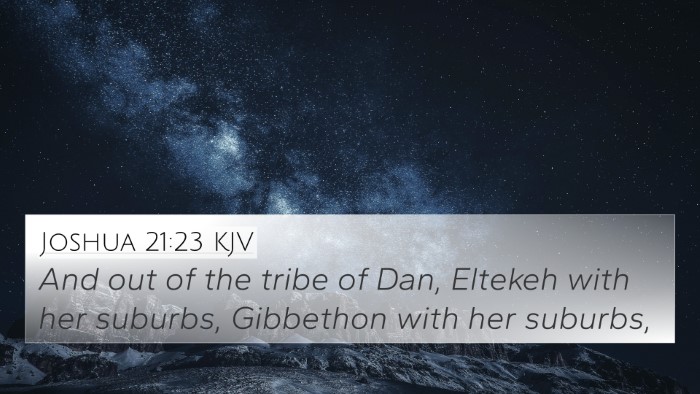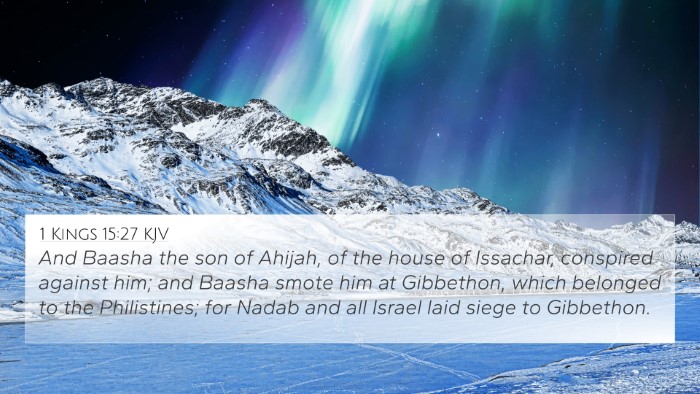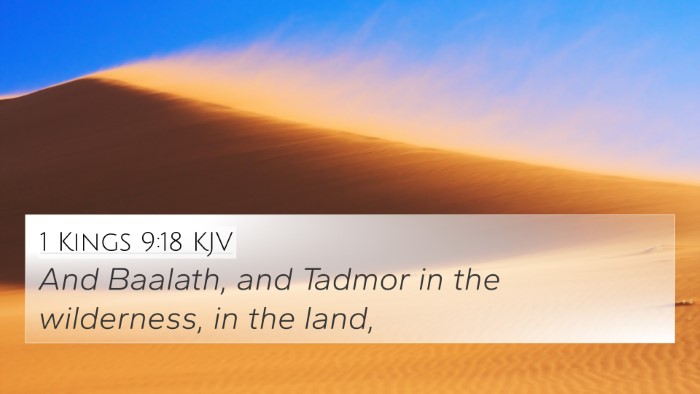Bible Verse Meaning and Explanation: Joshua 19:44
The verse Joshua 19:44 states: "And Eltekeh, and Gibbethon, and Baalath," and follows a listing of cities associated with the inheritance of the tribes of Israel. This portion of the scripture emphasizes the division of land among the tribes and the fulfillment of God's promise to His people regarding their inheritance in the Promised Land.
Summary of Insights
In this verse, several essential themes can be extracted from the commentaries of well-respected biblical scholars like Matthew Henry, Albert Barnes, and Adam Clarke
- Covenant Fulfillment: The distribution of land represents God's faithfulness to His covenant with Abraham, Isaac, and Jacob, ensuring that their descendants would possess a land of their own (Matthew Henry).
- Historical Importance: Each city mentioned holds historical and geographical significance in the narrative of Israel's settlement and provides insights into the tribal allotments and their strategic importance (Albert Barnes).
- Symbolism of Land: The land itself signifies more than just physical territory; it is an emblem of spiritual inheritance and belonging to God's chosen people, highlighting themes of identity and purpose (Adam Clarke).
- Community Structure: The mention of cities illustrates the social structure and organization of the Israelite community, showcasing the importance of cities as centers of worship, governance, and daily life (Matthew Henry).
Cross-References to Joshua 19:44
This verse can be supported and expanded upon through various cross-references found in the Bible. Here are some significant connections that aid in a holistic understanding of the scripture:
- Numbers 34:1-15: Overview of land distribution to the tribes of Israel, emphasizing the significance of God's commands regarding their inheritance.
- Deuteronomy 1:8: God’s promise to Israel to give them the land; this promise is reiterated throughout the pentateuch.
- Joshua 13:14: Mention of the Levites' special inheritance, which underscores the idea of distinct roles within the community.
- Joshua 14:1-2: Further details on the distribution process of land and tribal inheritances, showing the methodical approach taken by Joshua.
- 1 Chronicles 6:54-81: This reference affirms the heritage of cities for the Levites and connects back to Joshua's directives.
- Joshua 21:1-45: Discusses the cities assigned to the Levites, offering insight into the spiritual implications tied to their inheritance.
- Hebrews 11:9-10: References the faith of Abraham and his heirs concerning the Promised Land, showing continuity in God's promises.
- Isaiah 54:3: Provides a prophetic insight concerning the expansion of God’s people over land, signifying inheritance and growth.
- Luke 19:17: Insights into the faithful stewardship over God’s given resources, reflecting the theological implications of God’s provisions.
- Romans 4:13: The promise to Abraham and his seed is presented, showing the broader application of inheritance spanning both the Old and New Testaments.
Thematic Connections
The verse encapsulates several fundamental biblical themes that can be explored through systematic cross-referencing:
- The Promise of Land: Many verses throughout Genesis and Exodus encapsulate the divine promise of land to the people of Israel.
- Divine Guidance: Understanding how God guided His people to their inheritance can be reflected upon in the books of Exodus and Numbers.
- Community and Identity: The cities serve as a basis for identity among the tribes, a recurring theme throughout the narratives of the Old Testament.
Using Bible Cross-References
Cross-referencing Biblical texts enhances understanding and interpretation. For those looking into in-depth study, here are some tools and methods:
- Bible Concordance: Utilize a concordance to find keywords associated with Joshua 19:44.
- Bible Cross-Reference Guide: Refer to guides that showcase connections between various scriptures for thematic studies.
- Cross-Reference Bible Study: Implement methods that engage cross-references for deeper comprehension of related texts.
- Identifying Connections: Cross-reference not only within the Old Testament but also link themes to New Testament teachings.
Conclusion
In summary, Joshua 19:44 provides a snapshot of the historical and theological backdrop of Israel's inheritance in the Promised Land. It reminds believers today of the faithfulness of God in fulfilling His promises, the importance of community structure, and the spiritual significance of land as a divine provision. Through careful study and cross-referencing, a richer understanding can be gained, leading to a more profound appreciation of the scriptures and their relevance to both historical and contemporary contexts.
